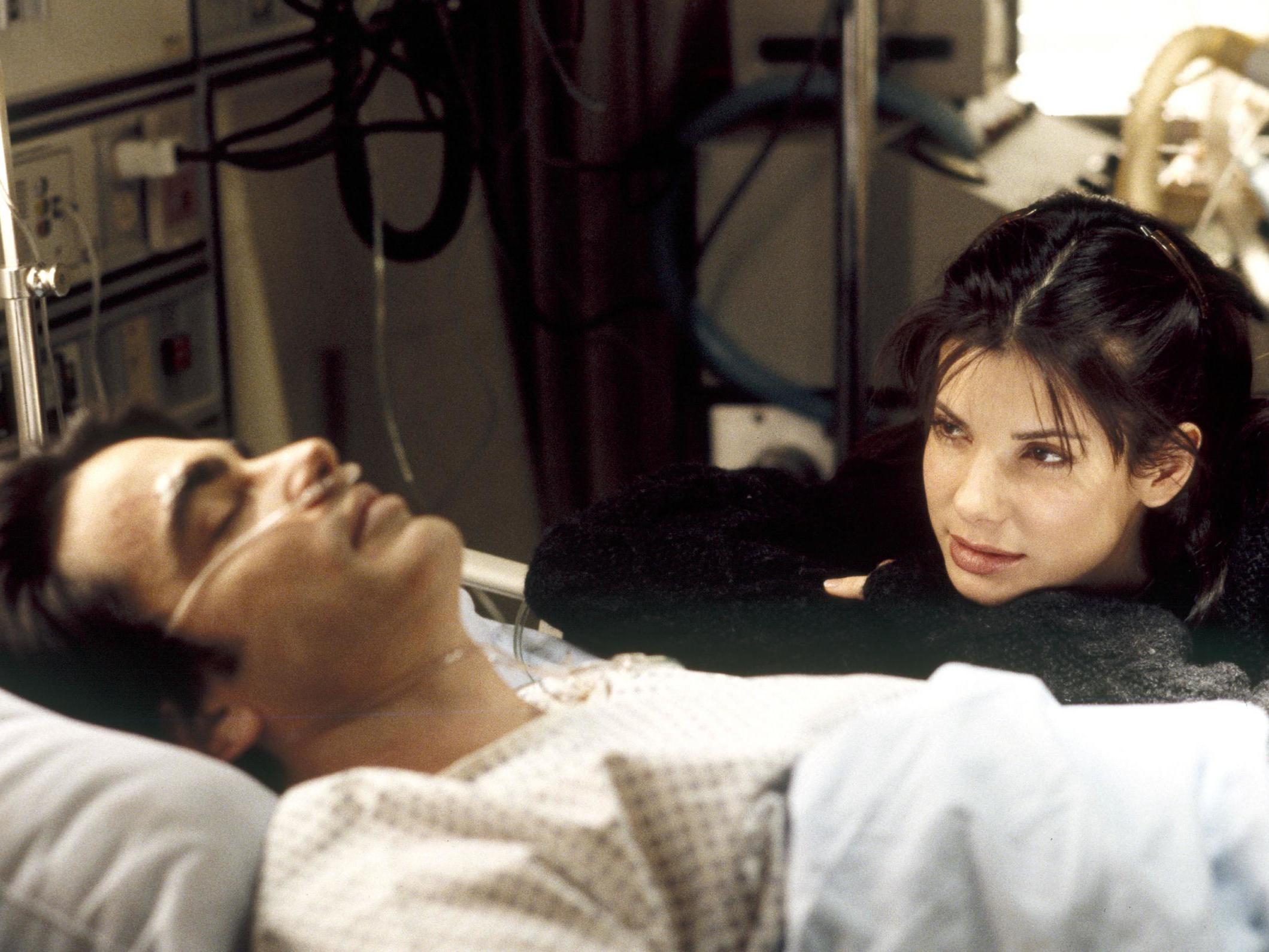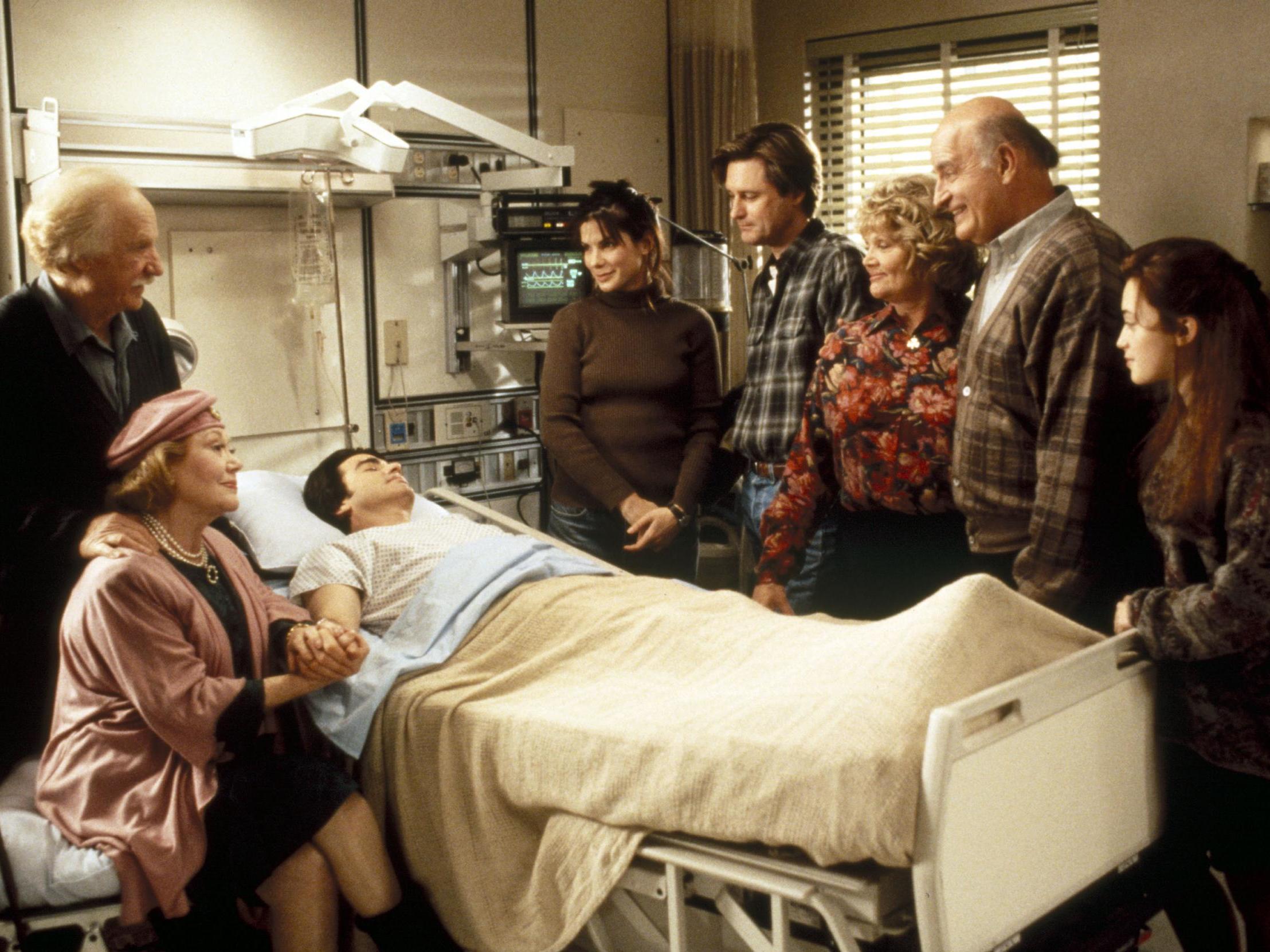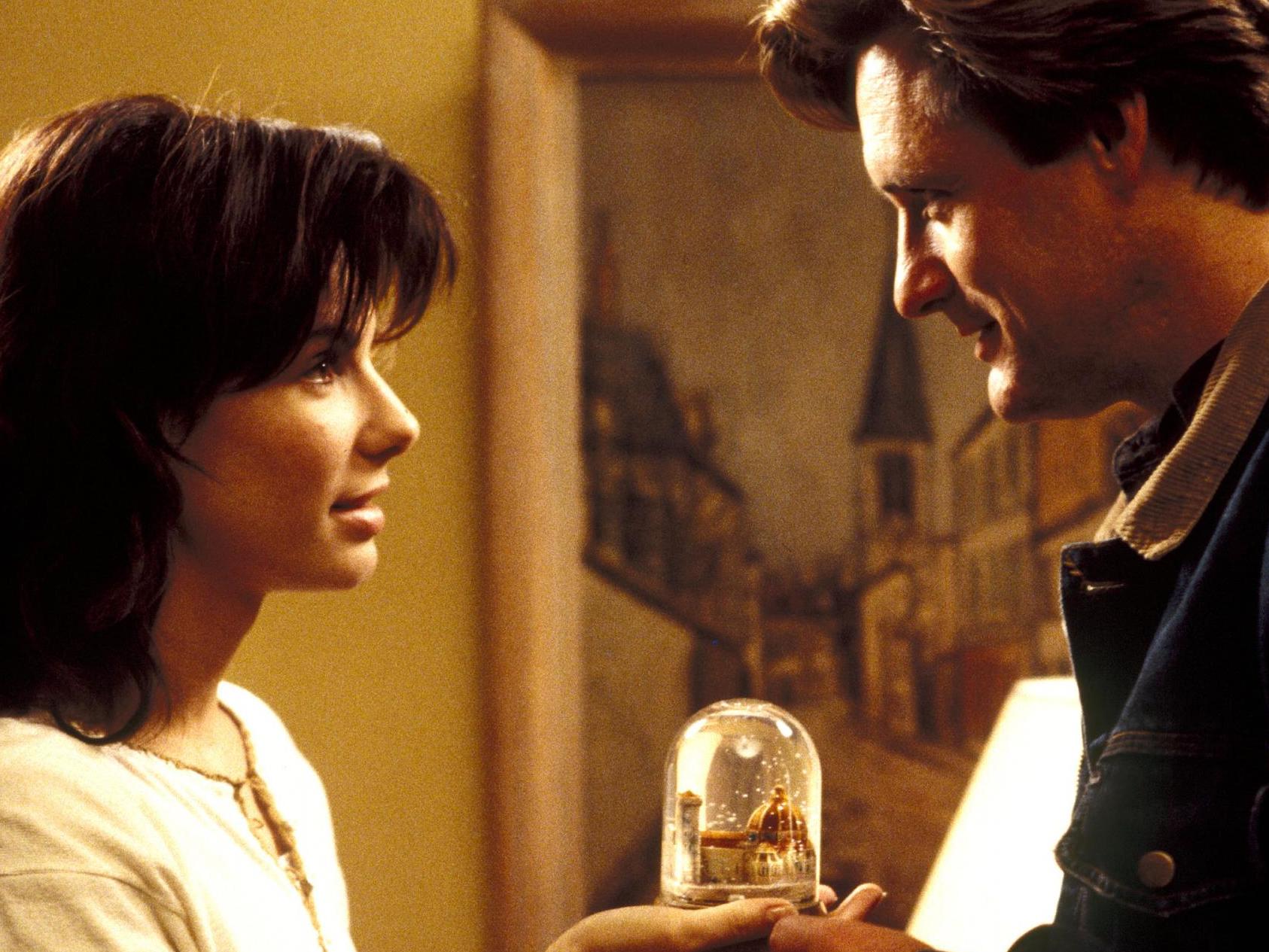Stalking, identity theft, gaslighting: Is While You Were Sleeping the most deranged romcom ever?
The hit Sandra Bullock film represented the peak of Hollywood’s bonkers romcom phase. Twenty-five years after its release, Ed Power looks back on one of Hollywood’s strangest love stories, which, for its creators, was a bittersweet success

Your support helps us to tell the story
From reproductive rights to climate change to Big Tech, The Independent is on the ground when the story is developing. Whether it's investigating the financials of Elon Musk's pro-Trump PAC or producing our latest documentary, 'The A Word', which shines a light on the American women fighting for reproductive rights, we know how important it is to parse out the facts from the messaging.
At such a critical moment in US history, we need reporters on the ground. Your donation allows us to keep sending journalists to speak to both sides of the story.
The Independent is trusted by Americans across the entire political spectrum. And unlike many other quality news outlets, we choose not to lock Americans out of our reporting and analysis with paywalls. We believe quality journalism should be available to everyone, paid for by those who can afford it.
Your support makes all the difference.From the admittedly dystopian vantage point of 2020, the Nineties can feel like a foreign country. That’s especially true of the lighthearted entertainments of the era. This was the golden age of the Truly Bonkers Romcom (“TBR”, as experts refer to it today). And there is no more unsettling example than the bizarre, coma-themed Sandra Bullock blockbuster While You Were Sleeping, which marks its 25th anniversary today.
Romcoms have a rich lineage extending all the way back to Hollywood in the wisecracking Thirties and Forties (or perhaps even further: there is a school of opinion Shakespeare invented the romcom with A Midsummer’s Night Dream). But, much as the end of the age of the dinosaurs witnessed a flourish of gonzo big lizards with weird horns and too many teeth, so the heyday of the Truly Bonkers Romcom was dominated by grotesque, lumbering date movies. And then came the great extinction event as cinema-goers had a messy public break-up with the genre, fleeing instead into the arms of superheroes and prestige TV.
In While Your Were Sleeping, Bullock plays Lucy, a lonely ticket-station attendant working for the Chicago public transit system. She becomes obsessed with a dishy commuter with great hair and Oscar-worthy eyebrows (Peter Gallagher). When he falls into a coma after a mugging, she naturally passes herself off as his fiance.
Lovelorn Lucy maintains the ruse even as he wakes and an actual fiance (Ally Walker) emerges from the woodwork. But then, having fallen in love with the mysterious stranger’s scrappy, sarcastic brother (Bill Pullman) while Peter was sleeping, Lucy ditches her former crush and heads into the sunset with his sibling. Cue end credits and enough melted hearts to raise global sea levels.
In its unsettling central premise, the film was by no means an outlier. Pretty Woman had already cast Julia Roberts as a prostitute falling in love with Richard Gere’s creepy businessman who, by dint of his wealth and status, is clearly in a position of authority over her. In the 1987 classic Overboard, Goldie Hawn is a heiress who suffers amnesia and is essentially enslaved by Kurt Russell’s blue-collar knuckle-dragger as a homemaker and mother to his children.
Later, Richard Curtis’s Love Actually (a different decade but still very much a Truly Bonkers Romcom) would feature Andrew Lincoln as a charming underdog stalking his best friend’s wife. And My Best Friend’s Wedding would star Julia Roberts as a sociopath trying to prise her closest chum away from his fiancee (Cameron Diaz as a character whose mortal transgression is that she is bubbly and demonstrative). Clueless’s happy ending, meanwhile, has Alicia Silverstone’s Cher falling in love with her brother in the form of a baby-faced Paul Rudd (alright, her step-brother – but still). This was a weird time for couples going to the cinema.
And yet, without question, While You Were Sleeping is the Truly Bonkers Romcom to rule them all. Watched today, it unfolds like a paean to stalking, identity theft and gaslighting. It also insists on swaddling Bullock in so many layers of luxuriant knitwear Elle magazine dubbed it “one of the only movies to devote two full hours to creating a visual mood board for the concept of staying in bed all day”.
As a modern fairytale, it isn’t without its charms. Bullock, aged 30, was coming into her own as Hollywood’s ultimate girl next door. And she shares genuine chemistry with Pullman’s Jack, the tousle-haired brother of sleeping beauty Peter. Granted, he was 11 years Bullock’s senior but a quarter of a century ago, nobody noticed these things.
Still, there’s no getting around the fact the film is a valentine to lying your way to true love. Lucy wins the affections of Peter’s family by passing herself off as his mysterious girlfriend. They take her into their hearts so that when Peter wakes with no memory of the love of his life, they insist it is temporary insomnia (her secret is known only by Peter’s eccentric godfather, who keeps schtum).

Watch Apple TV+ free for 7 days
New subscribers only. £8.99/mo. after free trial. Plan auto-renews until cancelled

Watch Apple TV+ free for 7 days
New subscribers only. £8.99/mo. after free trial. Plan auto-renews until cancelled
Today, the premise would be the stuff of psychological thrillers. And to be fair, at the time, the identity swap storyline did prompt raised eyebrows in Hollywood. The film’s initial title was Coma Guy – a name that didn’t even try to soft-pedal its disturbing central idea. That was at the point at which the screenplay’s writers, Fredric Lebow and Daniel G Sullivan, were hustling it around Hollywood.

They’d been trying to break into the industry without even a glimmer of success since the mid-Eighties. Sullivan had, on the side, worked as a fry cook at his parent’s restaurant in New England, topping up his income with a side job as an elevator operator.
Lebow had, for his part, washed dishes and manned an information desk at the Pritikin Centre, an upscale Miami spa frequented by the rich and famous. Such was their desperation to get a foot in the door of Hollywood that he and Sullivan once anonymously slipped a script into a postal slot at the spa belonging to comedian and producer Rodney Dangerfield. He never got back to them.
“The most humiliating was when I pitched something that was obviously overly sentimental, and the two executives just burst into hysterics,” Lebow told the Los Angeles Times in 1995. “They could not stop laughing for about 20 minutes. They were spitting out their Evian.”
The idea for While You Were Sleeping came to them over lunch in the late Eighties. Lebow was lamenting his disastrous love life. “I told Danny, ‘Even if I wanted to, I couldn’t get a date with a woman who was brain dead,’” he recalled.
“Brain dead” and “date” set off a giant lightbulb. They bashed out a story treatment called “Coma Girl”, about a woman who bangs her head and spends most of the movie unconscious in hospital.
“We pitched it to Meg Ryan’s production company hoping we’d get interest from Meg to star in it,” Lebow told BuzzFeed in 2015. “Her development executive said to us, ‘Firstly, why would Meg want to do this movie if she’s in a coma for most of it?
“And secondly, you guys are creeps! It’s kind of predatory with this guy telling this comatose woman’s family that he’s engaged to her. Why don’t you flip it around – let the woman be the one fabricating the story. Then it’s no longer predatory, it’s funny.”
They were taken under the wing of producer Arthur Sarkissian (later to strike gold with the Rush Hour series). With the gender of the comatose character changed to male, he saw potential – and paid these two unknowns $10,000 to write a script. By early 1994, a fully fledged bidding war had broken out for Coma Guy, with Paramount ultimately paying in the high six figures. Their one caveat: that the name be changed to While You Were Sleeping.
Yet this fulfilment of a lifelong dream was tempered with sadness. Lebow’s father died the night before the sale was closed. Sullivan, by contrast, was celebrating a lottery win by his brother.
If While You Were Sleeping was a big break for Lebow and Sullivan, it was also a huge opportunity for director Jon Turteltaub. He’d had a hit with the John Candy Jamaican bobsled drama Cool Runnings in 1993. Alas, that film had typecast him as a director of cute family comedies.
“The only movies I got sent were kids’ movies. Everything was a kid’s movie. Every script had some kid with a disease and some animal who was his best friend…,” he recalled to Slashfilm in 2010. “I was desperate to find a real romantic comedy, because that was like a real grown-up movie. After a long search and a lot of auditioning, I was able to get While You Were Sleeping.”
Turteltaub had signed on understanding While You Were Sleeping would have a heavyweight cast. Geena Davis was rumoured to be playing Lucy, with Harrison Ford as Jack. Lucy was also offered to Julia Roberts and Demi Moore. Matthew McConaughey auditioned for the Pullman part, but the producers found his thick Texas accent offputting.
Enter Sandra Bullock, not quite yet cinema’s sweetheart but a name to watch on the back of Demolition Man, in which she’d held her own against Sylvester Stallone, and her role opposite Keanu Reeves in Speed.

“Sandra contacted the studio and said it was just the kind of thing she wanted to do, that she could relate to so much of it – especially the loneliness, the importance of family,” said Sullivan to Buzzfeed. “And at the time she wasn’t that well known. Even when Speed was released, she wasn’t a huge star – I think she even considers WYWS her breakout movie, the one that launched her career.”
For the part as dishy but mostly unconscious Peter Callaghan, Turteltaub cast TV actor Peter Gallagher. He was appropriately slick and handsome – the original of the suave businessman species later exemplified by Mr Big in Sex and the City – and those eyebrows should have had their own multi-picture deal. However, his key attribute, it would turn out, was his ability to doze off on set, which made the scenes in which he lies comatose more authentic.
“I just had to surrender any kind of self-consciousness with regard to what my body might be doing while I’m sound asleep,” Gallagher told Vulture. “We won’t even go into all the embarrassing things that can happen when you’re sound asleep and the camera’s rolling, and people you respect are standing around. You figure, hey, I didn’t come all this way to pretend.”
On its US release on 21 February 1995, While You Were Sleeping was received by critics with a shrug. Nobody questioned the fact that Bullock’s character spends chunks of the movie lusting over a man clinging to life in an ICU ward. Indeed, most of the commentary centred on her looks.
“A shy heroine in the gorgeous-wallflower tradition,” said The New York Times, “She drowns in oversized clothing as Annie Hall did and seems in a perpetual state of comic dishevelment.”
Such observations did little to derail While You Were Sleeping, which earned $182m from a budget of $17m. Bullock duly went on to become one of the brightest stars of the ensuing decade. For Sullivan and Lebow, however, the movie proved hugely bittersweet.
Their big moment in the sun was also their swan song. Twenty-five years on it remains their only filmed script. The romcom would likewise go into decline, notwithstanding recent efforts by Netflix to revive it with cheap and cheerful productions such as To All the Boys I’ve Loved Before and the recent Love Marriage Repeat.
Those films have their fans and provide an alternative to audiences seeking escapism that doesn’t involve superheroes slapping one another to a pulp. But they are unmistakably a niche interest – every bit as much a genre as science fiction or horror.
While You Were Sleeping has, meanwhile, become a curio from another time. And if the writers never made another film, they can at least look back with pride on their singular contribution to Nineties cinema.
“After WYWS, for a period of three to five years, we could do anything we wanted,” said Lebow. “But then if another movie isn’t made, you can fall off the radar. For me and Dan, we feel blessed it afforded us an incredibly solid career. And we made some good money.”
Join our commenting forum
Join thought-provoking conversations, follow other Independent readers and see their replies
Comments